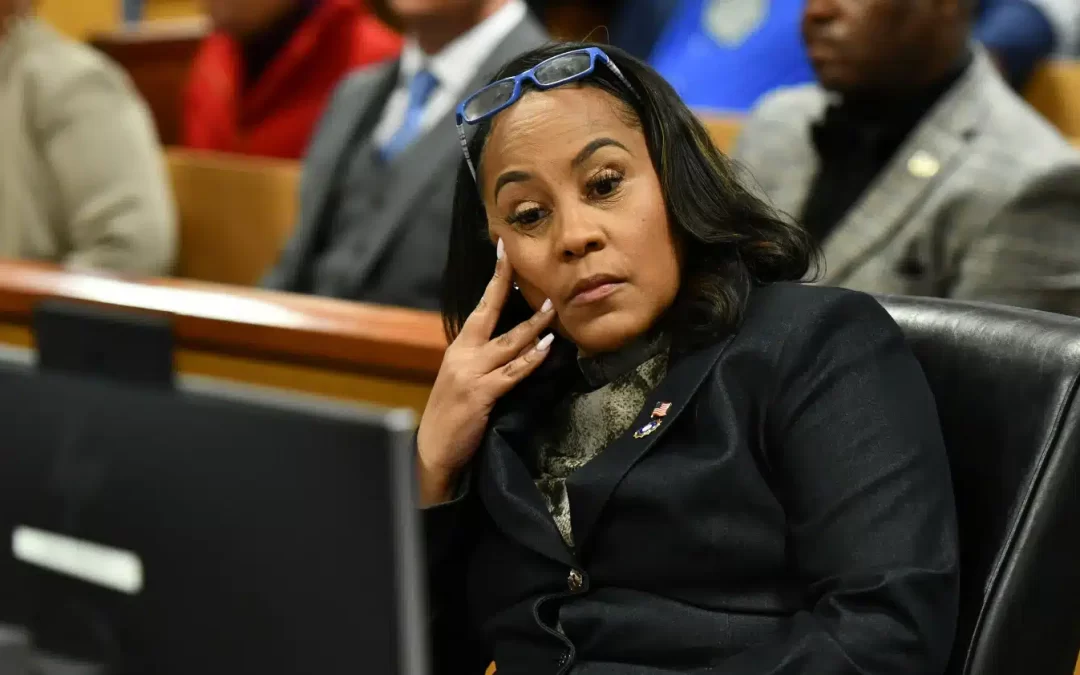More damning evidence has emerged from the misconduct hearing of Fulton County District Attorney Fani Willis.
Text messages between Terrence Bradley and Ashleigh Merchant’s attorneys have surfaced, and they contain information that defies Willis’ sworn testimony about when her affair with Nathan Wade began.
Renowned legal analyst Phil Holloway made the texts on X public, drawing attention to the significant inconsistency in Willis’ story. The texts claim that before Willis took office as District Attorney, he and Wade—both significant figures in the legal community—began a romantic relationship.
This stands in stark contrast to Willis’s earlier admission that the affair began in 2022. The texts imply a longer time frame than previously acknowledged, saying, “It started when she left the DA’s office (as ADA) and was judge in South Fulton.”
Currently, Willis is leading a significant RICO lawsuit against former President Donald Trump, Michael Roman, and other parties. Roman has submitted a move to have the indictment dismissed, claiming that Willis had a conflict of interest and that she had transferred public funds to her spouse, Nathan Wade.
Roman contends that since this money was returned in the form of opulent travel, there may have been a federal law breach—more precisely, “Honest Services Fraud” and a RICO violation.

Terrence Bradley, Nathan Wade’s divorce attorney, took the stand on Tuesday amid a flurry of rumors and debate.
The testimony focused on the timeline of Wade’s romantic involvement with Fani Willis, but it was riddled with evasions and lacked specific details. The timing of the relationship has drawn attention because it may exclude Willis from her participation in the Georgia election fraud case against Trump.
Bradley appeared to provide contradictory accounts of his knowledge about the alleged trips that Wade and Willis took, which put his credibility under severe pressure.
Bradley, who was Wade’s former legal partner, was under constant pressure to clarify the start of Wade and Willis’s relationship.
Bradley’s answers were characterized by conjecture and uncertainty, despite the ferocity of the questioning, which left the courtroom unclear.
There was an admissibility challenge to his testimony in court. “It was—I was making assumptions. I was lacking a Well, Bradley acknowledged, “No one told me that.” “You know, that was just conjecture. If you’re asking for specifics, I’m afraid I can’t answer.
Willis and Wade had acknowledged their relationship in a court document earlier in February, and the legal disclosures made last month revealed a complex web of personal ties between them.
Based primarily on purported financial entanglements, Roman’s and other implicated parties’ attorneys have pushed to have the involved prosecutors removed from the proceedings. They claimed that Wade has amassed nearly $700,000 since entering the case in 2021, some of which he used to finance his leisurely getaways with Willis.
But Willis insisted that they had divided the travel costs equally, denying any financial conflict and claiming that their professional judgment and their relationship to the case were irrelevant.
In August of last year, Trump and eighteen other defendants were indicted on charges of racketeering, which was connected to purported attempts to rig multiple crucial states’ presidential election results.
Several legal analysts say that DA Willis could face perjury charges for her testimony about a relationship with a special prosecutor.
Several legal experts have expressed concerns about Willis’ testimony.
Willis, a Democrat, may face charges of perjury from Georgia Attorney General Christopher Carr, according to Eric Anderson, an attorney at Early Sullivan Wright Gizer & McRae in Los Angeles, California.
“Given the political climate, I would not be completely surprised if the attorney general, a Republican, acts. Attorney General Carr has shown a willingness to take on elected officials in criminal proceedings before. When it comes to politics, anything is possible. Unless the alleged perjury is about a fact material to the matter at hand, perjury charges are not likely for a regular witness,” Anderson said.
Stephen Gillers, a law professor at New York University, told Newsweek that Trump’s lawyers want “to shift the question before the court from disqualification to perjury.”
“The judge should focus on the real disqualification question here. Is there any basis to find that Willis chose to pursue the case to generate income for Wade, which he would then use to take her on luxury trips? The answer is no. Willis started her investigation in February 2021 and did not hire Wade, who was not her first choice, until nine months later. She got an indictment and four guilty pleas,” Gillers said.
Under oath, Willis stated that she didn’t start dating Wade until she assigned him to the Trump case.
But the former president has summoned Wade’s phone records and engaged a tech specialist to purportedly demonstrate that he spent time at Willis’ residence well in advance of the inauguration of the election fraud investigation.









